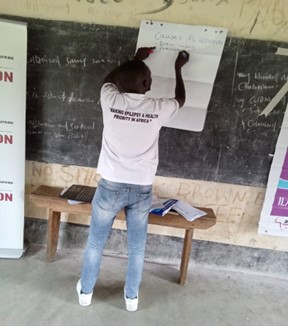Life for many people in South Sudan remains challenging due to ongoing conflict, economic instability, and food insecurity. Local groups and their international supporters are coming together to provide much-needed relief and lay the groundwork for a healthier, more stable future, but their efforts are too often overlooked by global news outlets.
Mvolo County, located in the southern part of the country, is home to approximately 65,000 people living primarily in small towns and rural villages. In this area, the International Bureau of Epilepsy has initiated the Epilepsy Awareness Mvolo (EAM) project to transform the way epilepsy is perceived and managed within the community.
A unique strategy of the project has been the establishment of “stigma benches” in key locations within the community. These benches serve as counseling and psychosocial support hubs for individuals and families affected by epilepsy. Over 20 individuals, including women and young people, have already benefited from the support offered at these benches, helping them to cope with the challenges of living with epilepsy.
EAM aims to shift perceptions not just within the households of people living with epilepsy (PLWE). The project is equipping community-based volunteers, teachers, and religious leaders with the tools and knowledge necessary to effectively tackle epilepsy. We invite you to learn more about their key activities and milestones:
Initial Orientation by Amref
The project kicked off with a half-day orientation session conducted in April 2024 by project partner the African Medical and Research Foundation (AMREF). This session addressed the unique challenges presented by epilepsy, including the unusual nodding syndrome prevalent in Mvolo County.Awareness Creation
School Workshops
Recognizing that discrimination against people living with epilepsy often occurs within educational environments, the project conducted two workshops at schools in Mvolo County. These workshops brought together approximately 50 community resource persons, teachers, members of the county education department, and student representatives, sensitizing them to epilepsy-related issues.Community and Household Engagement
Over the course of seven days, the project reached deep into the community, conducting engagement meetings in seven different villages across Mvolo County. A total of 259 participants took part in these meetings, where discussions centered around reducing stigma and promoting understanding at both the community and family levels.Mass Media Outreach
Leveraging the power of radio, the EAM project extended its reach to an even broader audience. A radio talk show aired on a local station, delivering epilepsy awareness messages to an estimated 15,030 listeners. This mass media approach was instrumental i spreading awareness on a large scale.Looking Ahead
The Epilepsy Awareness Mvolo project is more than just an awareness campaign—it is a movement towards transforming how epilepsy is understood and managed in South Sudan. By breaking down barriers, educating communities, and providing much-needed support, this effort is paving the way for a more inclusive and empathetic society for people living with epilepsy in Mvolo County. As the project continues to evolve, its impact will spread far beyond the borders of Mvolo, inspiring similar initiatives across the region.
You can follow the activities of Epilepsy Awareness Mvolo on their Facebook page.
In the coming months, IBE-Africa Region will convene a group of people with epilepsy and their caregivers from various African countries to evaluate and generate feedback on our in-progress Guide to Epilepsy and Seizures. This crucial partnership will help us to better provide accurate, relevant, and accessible information to our primary audiences in local communities. Participation from groups like EAM and IBE is central to our goal of disseminating accessible information about epilepsy treatment and prevention, ending epilepsy stigma, and improving the health and wellbeing of people with epilepsy.
Hesperian’s collaboration with local community groups is essential to developing resources that are useful and easy to understand. We are currently seeking additional feedback partners in Latin America, South East Asia, and the Middle East. To learn more about this opportunity, please send an inquiry to [email protected].

 Asimverse CC-BY-SANavigating Transitions in the Global Electronics and Semiconductor Industry:...
Asimverse CC-BY-SANavigating Transitions in the Global Electronics and Semiconductor Industry:...
